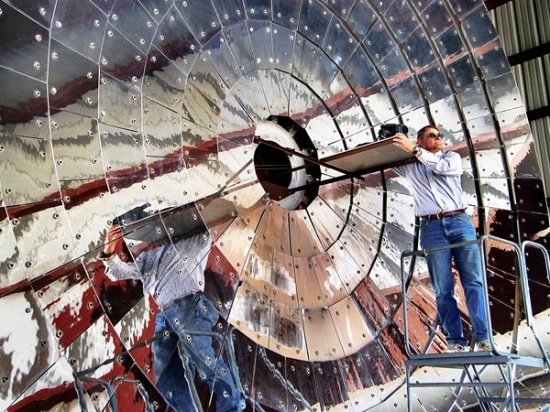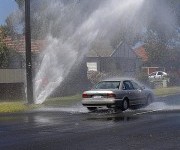A burst water pipe.Photo: starr61Cross-posted from Climate Progress.
This year’s record heat has spawned cow-killing algae, caused sidewalks to explode, and turned reservoirs bloodred. Now it’s causing an even costlier problem for communities in the U.S. — exploding water pipes.
As severe heat dries out the ground, old pipes shift around and are more susceptible to breaking. The problem is exacerbated by an increased demand for water during hot days. Towns across the U.S. are seeing increased rates of water pipe failures. Oklahoma saw 685 water main breaks since July — about four times the normal rate.
Kemp, Texas was the most recent victim. Last Wednesday, town officials were forced to shut off water supplies for the 1,110 residents after 14 water pipes burst:
Kemp Mayor Donald Kile says the old infrastructure has a lot to do with the problem. The local water treatment plant was last replaced 40 years ago, and a lot of the town’s 30 miles of pipelines were installed in the 1930s and haven’t been updated in years.
“It’s sad to say, but it’s poor planning,” said Kile, who was elected mayor recently. “When they put that water treatment plant in, they should have implemented something then … It just wasn’t ever done.”
With virtually no updates to its water infrastructure in 40 years, Kemp is facing a serious water-reliability crisis. And the town is representative of the rest of the country: The EPA says that about 700 water main ruptures take place in the U.S. daily because of aging pipelines. The EPA estimates the U.S. will need to invest in over $334 billion in water infrastructure over the next 25 years.
Climate change will make the problem far worse.
All across Texas this summer, water mains have exploded, causing flooding, damage to homes, and increasing future costs to taxpayers and utility customers. And as heat waves get more intense and put greater stress on water infrastructure around the country, those costs could increase substantially for towns like Kemp.
Kemp, however, is represented by Texas Gov. (and now presidential candidate) Rick Perry and Rep. Jeb Hensarling, both of whom are vociferous foes of climate action and the EPA.
Hensarling recently voted for a bill that would overturn the EPA’s science-based finding that greenhouse-gas emissions cause harm to human health and the environment. He also signed a pledge from Americans for Prosperity to “oppose any legislation relating to climate change that includes a net increase in government revenue.” Perry signed that pledge as well.
Perry recently made the argument that the EPA causes businesses to “stop spending money.” However, under EPA water programs, the agency assists communities in helping build and finance water infrastructure upgrades — just the kind of assistance towns and cities around Texas may need. Instead of recognizing those benefits for municipalities struggling with water problems, Perry says he’s praying away EPA regulations.
So while heat waves get more intense and the costs of water infrastructure failure continue to pile up for cities and towns around the country, the burden on consumers will become more apparent.
Meanwhile, the residents of Kemp are organizing a “pray for rain” rally tonight at the local park. Perhaps they should pray their government officials don’t defund the EPA.



